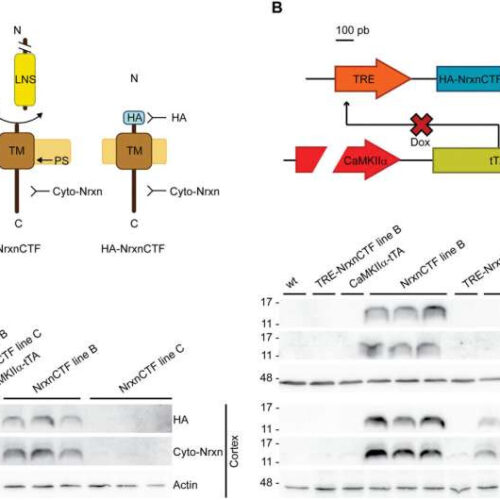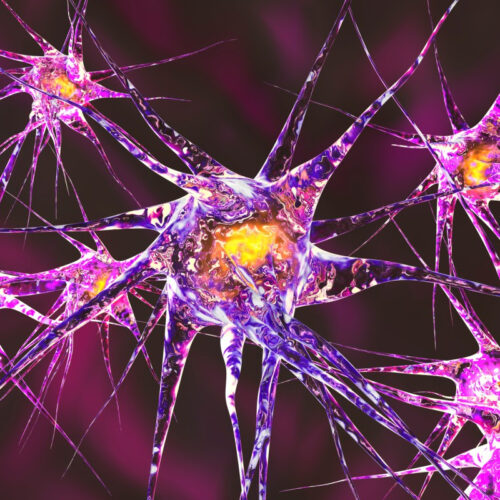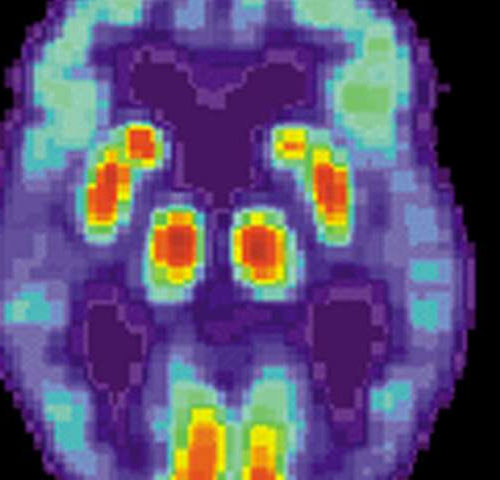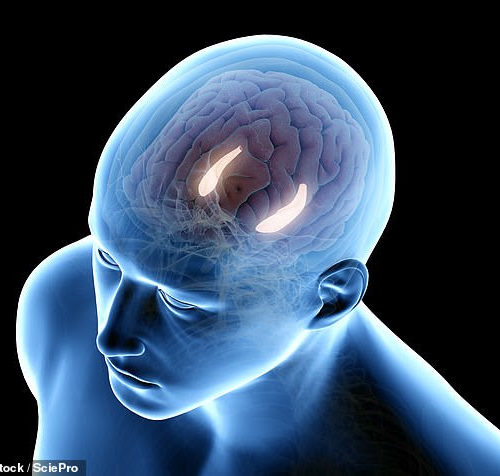by University of Seville Fig. 1. Generation of NrxnCTF transgenic mice. A) Schematic drawings showing the proteolytic processing of Nrxns by metalloproteases and PS (left) and the HA-tagged NrxnCTF transgene used in this study (right). The regions recognized by the HA and the cyto-Nrxn antibodies are indicated. LNS, Laminin/Neurexin/Sex hormone binding-globulin domain; TM, transmembrane region....
Tag: <span>memory loss</span>
Multiple sclerosis drug may alleviate Alzheimer’s memory loss
Alzheimer’s symptoms include memory loss. Michela Ravasio/Stocksy A drug doctors use to treat multiple sclerosis may be effective in treating Alzheimer’s symptoms, including memory loss. In mice, memory improved after 8 weeks of treatment with the drug. The treated mice also showed a reduction in amyloid plaques. Clinical trials are needed to show whether the...
Preclinical study finds success in reversing age-related memory loss
By Rich Haridy July 22, 2021 New research is focussing on modifying structures in the brain known as perineuronal nets to mitigate age-related memory declineSpectral/Depositphotos An intriguing new study from researchers in the United Kingdom is proposing an innovative method to treat age-related memory loss. The preclinical research shows memory decline in aging mice can be reversed by manipulating...
Fear of memory loss impacts well-being and quality of life
by Trinity College Dublin Credit: Trinity College Dublin Research from the Global Brain Health Institute (GBHI) at Trinity College suggests that experiencing high levels of fear about dementia can have harmful effects on older adults’ beliefs about their memory and general well-being. To date, few studies have measured the impact of dementia-related fear on daily functioning, despite...
Vector Trace cells allow us to remember where we put our personal belongings– Damage to these cells may help explain memory loss in many types of dementia
Vector Trace cells allow us to remember where we put our personal belongings Damage to these cells may help explain memory loss in many types of dementia Study builds on Nobel Prize-winning research into the brain’s ‘inner GPS system’ By JONATHAN CHADWICK FOR MAILONLINE Scientists have discovered a new type of brain cell that helps us remember where...
Brain network mechanism causing spatial memory impairment revealed
by University of California, Irvine New study, led by UCI School of Medicine’s Kei Igarashi, PhD, found that remapping of place cells, a brain circuit function to discriminate distinct environments, was disrupted in Alzheimer’s disease mice. Credit: UCI School of Medicine July 21, 2020—Patients with Alzheimer’s disease frequently suffer from spatial memory loss, such as...
Abnormal proteins in the gut could contribute to the development of Alzheimer’s disease
by The Physiological Society A new study published in the Journal of Physiology has shown that misfolded protein build-up in the gut could contribute to the development of Alzheimer’s-like symptoms in mice. This could suggest a new treatment approach for Alzheimer’s disease that would target the gut before symptoms of cognitive deficits appear in patients....
The science of the penny dropping: Scientists discover memory recall and formation happens at specific times ‘due to the oscillation of brainwaves’
By JOE PINKSTONE FOR MAILONLINE Memory formation and recall is linked to specific brainwaves called theta waves These fire three times a second and only when a person learns successfully They originate from the hippocampus region, deep inside a person’s brain They are again produced when a person remembers one of their memories Recall is...
Don’t just fear memory loss: Take action now to keep your brain sharp
by Cindy Krischer Goodman Credit: CC0 Public Domain Do you forget what you walked into the bedroom to get? One of the most common fears people have as they grow older is losing their memory. Keeping your brain healthy and your memory sharp is about more than doing puzzles or remembering what you needed in...
Alzheimer’s memory loss reversed by new head device using electromagnetic waves
Just released new results in the Journal of Alzheimer’s Disease indicate that in-home treatment with a bioengineered head device emitting electromagnetic waves reversed memory impairment of Alzheimer’s patients (AD) IOS PRESS Phoenix, AZ (September 17, 2019) – There is finally some encouraging news for the millions of Americans suffering from Alzheimer’s Disease. NeuroEM Therapeutics today announced findings...








